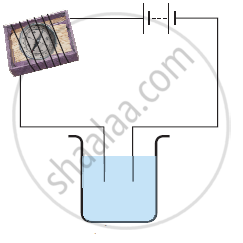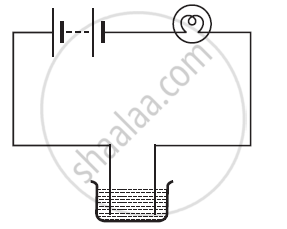Advertisements
Online Mock Tests
Chapters
2: Microorganisms : Friend and Foe
3: Coal and Petroleum
4: Combustion and Flame
5: Conservation of Plants and Animals
6: Reproduction in Animals
7: Reaching the Age of Adolescence
8: Force and Pressure
9: Friction
10: Sound
▶ 11: Chemical Effects of Electric Current
12: Some Natural Phenomena
13: Light
![NCERT solutions for Science [English] Class 8 chapter 11 - Chemical Effects of Electric Current NCERT solutions for Science [English] Class 8 chapter 11 - Chemical Effects of Electric Current - Shaalaa.com](/images/science-english-class-8_6:a1e5555c9030490085f2eedec974d08f.jpg)
Advertisements
Solutions for Chapter 11: Chemical Effects of Electric Current
Below listed, you can find solutions for Chapter 11 of CBSE NCERT for Science [English] Class 8.
NCERT solutions for Science [English] Class 8 11 Chemical Effects of Electric Current Exercises [Pages 146 - 147]
Fill in the blanks.
Most liquids that conduct electricity are solutions of ________, _______ and ________.
The passage of an electric current through a solution causes ______ effects.
If you pass current through copper sulphate solution, copper gets deposited on the plate connected to the ______ terminal of the battery.
The process of depositing a layer of any desired metal on another material by means of electricity is called ______.
When the free ends of a tester are dipped into a solution, the magnetic needle shows deflection. Can you explain the reason?
Name three liquids, which when tested in the manner shown in Figure, may cause the magnetic needle to deflect.

The bulb does not glow in the setup shown in figure list the possible reasons. Explain your answer.

A tester is used to check the conduction of electricity through two liquids, labelled A and B. It is found that the bulb of the tester glows brightly for liquid A while it glows very dimly for liquid B. You would conclude that ______.
liquid A is a better conductor than liquid B.
liquid B is a better conductor than liquid A.
both liquids are equally conducting.
conducting properties of liquid cannot be compared in this manner.
Does pure water conduct electricity? If not, what can we do to make it conducting?
In case of a fire, before the firemen use the water hoses, they shut off the main electrical supply for the area. Explain why they do this.
A child staying in a coastal region tests the drinking water and also the seawater with his tester. He finds that the compass needle deflects more in the case of seawater. Can you explain the reason?
Is it safe for the electrician to carry out electrical repairs outdoors during heavy downpour? Explain.
Paheli had heard that rainwater is as good as distilled water. So, she collected some rain water in a clean glass tumbler and tested it using a tester. To her surprise, she found that the compass needle showed deflection. What could be the reasons?
Prepare a list of objects around you that are electroplated.
The process that you saw in the image is used for the purification of copper. A thin plate of pure copper and a thick rod of impure copper are used as electrodes. Copper from impure rod is sought to be transferred to the thin copper plate. Which electrode should be attached to the positive terminal of the battery and why?
Solutions for 11: Chemical Effects of Electric Current
![NCERT solutions for Science [English] Class 8 chapter 11 - Chemical Effects of Electric Current NCERT solutions for Science [English] Class 8 chapter 11 - Chemical Effects of Electric Current - Shaalaa.com](/images/science-english-class-8_6:a1e5555c9030490085f2eedec974d08f.jpg)
NCERT solutions for Science [English] Class 8 chapter 11 - Chemical Effects of Electric Current
Shaalaa.com has the CBSE Mathematics Science [English] Class 8 CBSE solutions in a manner that help students grasp basic concepts better and faster. The detailed, step-by-step solutions will help you understand the concepts better and clarify any confusion. NCERT solutions for Mathematics Science [English] Class 8 CBSE 11 (Chemical Effects of Electric Current) include all questions with answers and detailed explanations. This will clear students' doubts about questions and improve their application skills while preparing for board exams.
Further, we at Shaalaa.com provide such solutions so students can prepare for written exams. NCERT textbook solutions can be a core help for self-study and provide excellent self-help guidance for students.
Concepts covered in Science [English] Class 8 chapter 11 Chemical Effects of Electric Current are Conductor of Electricity: Liquid, Chemical Effects of Electric Current, Electricity, Conductors and Insulators, Conductor of Electricity: Liquid, Chemical Effects of Electric Current, Electricity, Conductors and Insulators.
Using NCERT Science [English] Class 8 solutions Chemical Effects of Electric Current exercise by students is an easy way to prepare for the exams, as they involve solutions arranged chapter-wise and also page-wise. The questions involved in NCERT Solutions are essential questions that can be asked in the final exam. Maximum CBSE Science [English] Class 8 students prefer NCERT Textbook Solutions to score more in exams.
Get the free view of Chapter 11, Chemical Effects of Electric Current Science [English] Class 8 additional questions for Mathematics Science [English] Class 8 CBSE, and you can use Shaalaa.com to keep it handy for your exam preparation.
